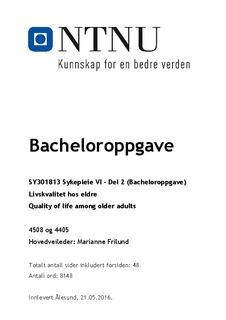Livskvalitet hos eldre.
Bachelor thesis
Permanent lenke
http://hdl.handle.net/11250/2416869Utgivelsesdato
2016Metadata
Vis full innførselSamlinger
Sammendrag
Bakgrunn: Innenfor sykepleievitenskap har begrepet livskvalitet fått økt oppmerksomhet de siste årene. Dette medfører et behov for helhetlig forståelse, tilnærmning og et behov for å få fram pasientens egen opplevelse av situasjonen (Rustøen 2010). Hensikt: Oppgavens hensikt er å undersøke eldre sin opplevelse av livskvalitet og hvilke faktorer som påvirker den. Ved å fremheve deres perspektiv ønsker oppgaven å gi sykepleier en bedre innsikt og forståelse for hva som kan gi eldre en bedre hverdag. Metode: Dette er en systematisk litteraturstudie. Vi søkte i databasene: CINAHL, PubMed, Oria. Vi inkluderte 8 forskningsartikler, derav tre kombinerte artikler og fem kvantitative artikler. Vi har brukt Evans' innholdsanalyse for å analysere artiklene og kategorisere relevante funn for vår problemstilling. Resultat: Vi kom frem til fire hovedfunn, som består av: Mentalitet, livssituasjon, fysisk helse og sosialisering. Vi har kommet frem til mange sammensatte faktorer som påvirker livskvaliteten. Det ble blant annet funnet at det var det viktig å være optimistisk og ha en positiv holning for å ha god livskvalitet, samt hvordan de mestrer endringer som aldring medfører. Det å ha en god fysisk helse var for noen det mest grunnleggende for å leve et godt liv, mens for andre var det ikke det viktigiste. Sosiale aktiviteter, og å beholde sin rolle i samfunnet var noe de fleste oppga som viktig. Konklusjon: God livskvalitet beskrives som å ha gode sosiale relasjoner, ha god hjelp og støtte rundt seg. Bo i et trygt og godt nabolag, engasjere seg i hobbyer og fritidsaktiviteter, samt opprettholde sin rolle i samfunnet. Det er også helt essensielt å ha et positivt psykologisk syn og aksept av omstendigheter som ikke kan endres. *** Background: Within nursing, the concept of quality of life gained increased attention in recent years. This entails a need for comprehensive understanding, approach and the need to bring up the patient's own perception of the situation (Rustøen, 2010). Aim: The purpose of this study is to examine elderly peoples perception of quality of life and the factors that influence it. By highlighting their perspective, this study wants to provide nursing a better insight and understanding of what can give elderly a better life. Methods: This is a systematic literature review. We searched the databases: CINAHL, PubMed, Oria. We included eight research papers, there of three combined articles and five quantitative articles. We used Evans' content analysis to analyze articles and categorize relevant findings for our problem. Results: We concluded with four main findings, consisting of: Mentality, life-situation, physical health and socialization. We have reached many complex factors that affects quality of life. Among other things, we found that it was important to be optimistic and have a positive attitude to have good quality of life, and how they cope with changes that aging brings. Having a good physical health was for some the most basic to living a good life, while for others it was not the most important. Social activities, and to maintain its role in society was something most reported as important. Conclusion: Good quality of life is described as having good social relationships, and to have good help and support in the surroundings. Live in a safe and good neighborhood, to be engaged in hobbies and activities, as well as maintain its role in society. It is also essential to have a positive psychological outlook and acceptance of circumstances that can't be changed.

